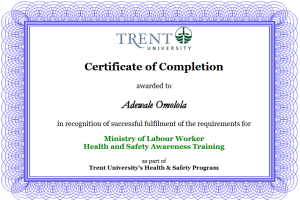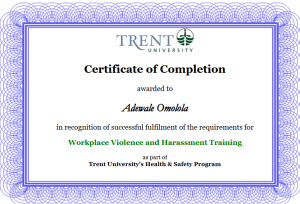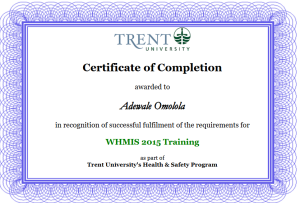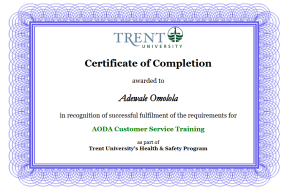Artifacts

The Ministry of Labour Worker Health and Safety Awareness Training is an essential foundation for nurses, as it prepares them to identify, address, and prevent workplace hazards. Nursing environments, such as hospitals and clinics, are high-risk workplaces. This training emphasizes the importance of creating a safe and healthy work culture, which is essential for the well-being of staff and patients. Nurses learn about their rights under workplace safety laws, such as the right to know about hazards, the right to participate in safety discussions, and the right to refuse unsafe work. It also clarifies their responsibilities, such as following safe work practices and reporting hazards. Training provides strategies to prevent common nursing-related injuries, such as needle-stick injuries, repetitive strain injuries, or exposure to hazardous materials. Prevention reduces downtime, medical costs, and emotional strain for both nurses and their employers. A safe nurse is a better nurse. By reducing the risk of injury or illness, this training allows nurses to focus on delivering high-quality patient care. The Ministry of Labour Worker Health and Safety Awareness Training is a cornerstone of workplace safety for nurses. By equipping them with knowledge and tools to navigate workplace risks, this training not only safeguards their well-being but also enhances overall workplace efficiency, compliance, and patient outcomes.

Workplace violence and harassment training for nurses is critically important for several reasons, as the healthcare environment often exposes nurses to unique risks. Nurses face physical, verbal, and emotional violence from patients, visitors, and even colleagues. Proper training equips them with strategies to de-escalate potentially violent situations, reducing the likelihood of harm. Many nurses may not recognize subtle forms of harassment or understand their rights. Training raises awareness of what constitutes violence and harassment, enabling nurses to identify and address these issues effectively. Constant exposure to aggression can lead to stress, anxiety, and burnout. Training programs provide tools to manage these challenges, fostering a healthier work environment. Nurses who feel safe and respected are more likely to provide high-quality care. Reducing workplace violence leads to a more focused and compassionate approach to patient care. Workplace violence and harassment training is not just about compliance; it’s a vital tool for safeguarding the health and dignity of nurses. By investing in such programs, healthcare organizations can create safer, more respectful environments that enable nurses to thrive both professionally and personally.

Workplace Hazardous Materials Information System (WHMIS) training is vital for nurses due to their frequent exposure to hazardous substances in healthcare settings. This training ensures nurses can handle, store, and dispose of these materials safely, protecting themselves, their colleagues, and patients. WHMIS training is an indispensable part of a nurse’s education and professional development. It not only safeguards nurses’ health but also contributes to a safer workplace, better patient care, and environmental protection. By understanding and applying WHMIS principles, nurses play a critical role in maintaining safety and compliance in the healthcare setting.

The Accessibility for Ontarians with Disabilities Act (AODA) is a crucial framework for ensuring inclusivity and equal access for individuals with disabilities in Ontario. For nurses, understanding and applying AODA principles is particularly important due to their role in providing care and ensuring equitable treatment for all patients. Nurses frequently interact with patients who have physical, sensory, mental, or cognitive disabilities. AODA compliance ensures these individuals receive care that accommodates their unique needs, removing barriers to healthcare access. The Accessibility for Ontarians with Disabilities Act is vital for nurses because it ensures that healthcare services and workplaces are inclusive, equitable, and accessible to everyone. By applying AODA principles, nurses uphold ethical and legal standards while improving care quality and outcomes for individuals with disabilities.

